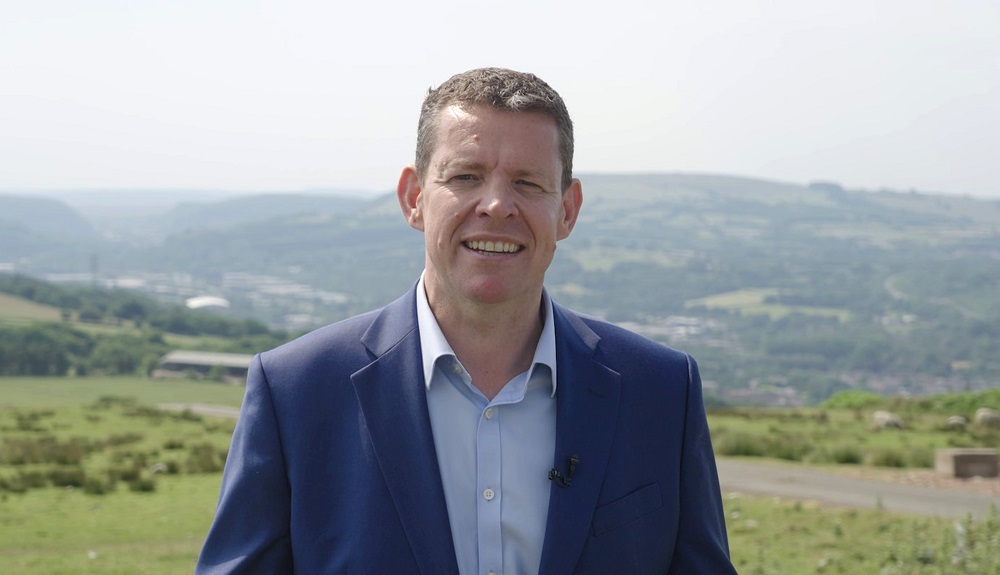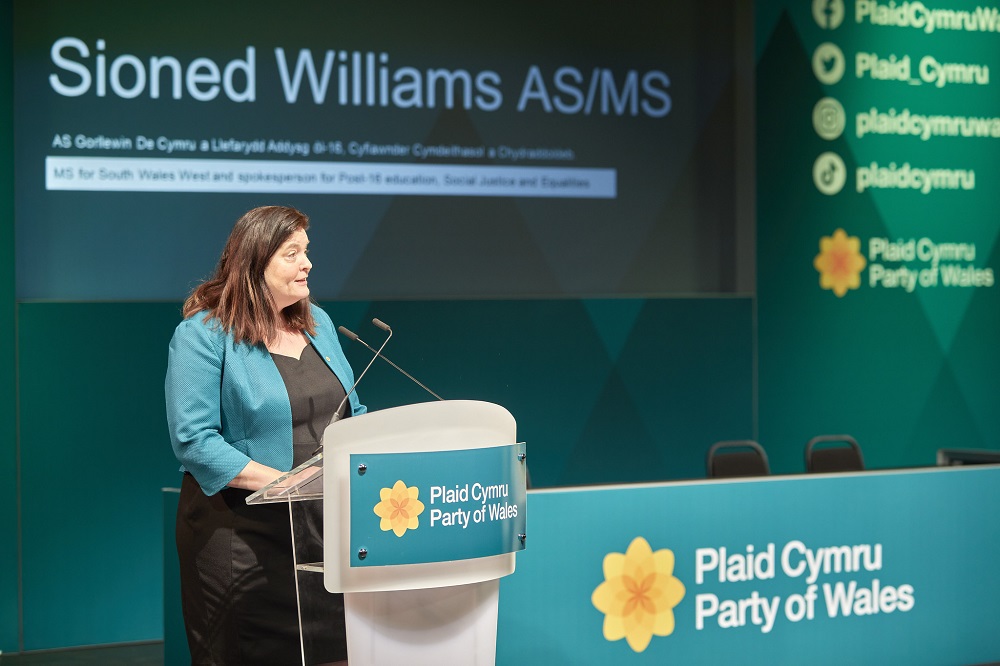What do we care for Plaid Cymru? Lessons from the Eisteddfod Maes

Matthew Hexter, Host, Hiraeth Podcast
Beth yw’r ots gennyf I am Blaid Cymru? What do I care for Plaid Cymru? This question, a pun on a line from one of my favourite Welsh language poems “Hon” by T.H Parry Williams, is one that many in Welsh politics will ask.
Plaid has just celebrated its 98th birthday as a political party, and just elected its 12th leader after a very difficult year. But rather than focusing on the fallout of the prosiect pawb report, which we covered in a number of episodes previously, in this episode we asked some more fundamental questions. What is the relevance of the party in the face of Labour dominance? Why have they struggled to break through in the same way their sister party the SNP has? Are they destined to be perpetual king makers? And will they ever lead a government of their own?
These are just some of the questions that we covered in our live episode of the Hiraeth podcast, recorded from the Cardiff University Tent on the Maes at the recent National Eisteddfod in Boduan.
We were joined by Sioned Williams MS, member of the Senedd for South Wales West and Plaid Cymru spokesperson on Social Justice, and Professor Richard Wyn Jones, Director of the Wales Governance Centre.
In Hon, when the question of “Beth yw’r ots gennyf I am Gymru?” (What do I care for Wales?) is asked, one could expect the poem to take a turn to simply list all the things that are wrong with Wales, and to a greater or lesser extent you would be right.
Much in the way that some will have seen the title of the pod and expected 40 minutes or so of criticism of the party, their strategy, or their purpose, and while there are certainly elements of that therein, much like Hon itself, we hope you realise that these questions come from a place of warmth.
In a young democracy such as Wales, it is important that all the parts of that democracy function well and that includes all its parties. It is vital that those parties, whether they are in government or otherwise, are scrutinised for the decisions they make and the effort they take to win elections.
The Present or should that be ever present question:
The importance of Plaid Cymru to Wales’s recent political history cannot be underestimated. A party that has, in terms of policies implemented, been very successful. However, many question their true purpose. Are they simply Labour’s think tank, or a political party determined to win power at any cost?
When I asked Sioned Williams what was more important to Plaid, policy, or power, she responded “Power is the aim, the form of the power is the question.” Richard Wyn Jones then responded that Plaid Cymru always prioritises policy, to which Sioned Williams noted that they prioritise Wales. An exchange that I am sure is often repeated by Plaid Cymru members, and a question that cannot be escaped. As TH Parry Williams said:
“Duw a’m gwaredo, ni allaf ddianc rhag hon” God help me, I cannot escape this”.
The Past:
During the recording, Richard Wyn Jones laid out a number of tests as to whether Plaid Cymru could be considered successful. I have taken the liberty of trying to answer them. As he was my personal tutor at university, I am sure he will not mind me answering another essay.
Firstly, policy. Plaid passes this test with flying colours. Despite themselves having never won an election in Wales, they have through various coalitions, co-operation agreements and budget deals have had more policies implemented by the Welsh Government than any party other than Labour.
This is not to mention the impact that their shock success in 1999 had on moving Labour towards the Welsh centre ground, not economically, or socially, but culturally. As a consequence of that election, they have made Labour a much more pro-devolution and a more culturally Welsh party. They decided after that point that they would not sacrifice the flag as figures like Carwyn Jones would argue was eventually the case for Labour in Scotland. In this way, Plaid Cymru are perhaps a victim of their own early successes.
Secondly, roles in government. The result of this test is a bit more ambiguous. Plaid Cymru have certainly held roles in government in Wales, now have two Designated members who arguably act as Deputy Ministers in the Welsh Government, and of course Dafydd Elis Thomas recently rejoined the party didn’t he. However, these opportunities have been few and far between.
Furthermore, when presented with the opportunity to lead the Rainbow coalition in 2007, a deal that would have included then leader Ieuan Wyn Jones becoming First Minister, they chose the deal with Labour that included the referendum on primary law-making powers. Again, this goes back to the inescapable question I posed earlier. Are Plaid a party to win power? Or a party to build a nation? Your answer to that question probably determines whether or not you think they pass this test.
Thirdly, electorally. It is hard to argue that Plaid Cymru have been particularly successful under this test. Despite the high-water mark of 1999, the party have continued to elect fewer members and receive fewer votes than the dominant Labour party, and at the last election found themselves in third place behind the Conservatives.
They have also not emulated the successes of their sister party the SNP. If you looked at the devolved parliamentary elections in 1999 and knew nothing else, you would assume it was Plaid and not the SNP that had become the dominant force in their polity. This is not the case.

As Sioned Williams noted during the podcast, perhaps this comparison is made too much. After all, Wales and Scotland are two very different polities. Just because we psych ourselves up for games against England in the same way does mean we must be psephologically akin. Though as we discussed in the podcast this difference may actually have more to do with the comparisons between Welsh and Scottish Labour then Plaid and the SNP.
At last year’s Eisteddfod in Tregaron, Richard Wyn Jones, when asked why Labour continue to win in Wales said, much to the chagrin of First Minister Mark Drakeford I may add, that Labour’s greatest selling point is that they are not the Conservatives.
However, in the context of Plaid Cymru, their biggest struggle is that they do not have the resources or reach of the Labour party, and as such have had their space in the political conversation cannibalised by the sentiment and approach of clear red water.
All too often, Plaid Cymru are forced to define themselves in contrast to Welsh Labour. Yet this is inevitable in a polity which has been dominated by Welsh Labour for a century, and where Welsh Labour have so firmly parked their tanks on Plaid’s policy lawn as to make it very difficult to distinguish themselves. This has led to Plaid Cymru focusing heavily on Independence as its USP.
Questions remain as to whether this was the right strategy at the last election, but the recent change in tone on the issue from Rhun ap Iorwerth shows that he may seek a different primary issue on which to fight the next election.
Next let’s discuss the issue of resources, in particular human resources. During the recording Richard Wyn Jones made a point about the relative activist bases of Plaid Cymru and Welsh Labour. He noted that many Plaid Cymru activists are members of their local choirs and community groups, inferring that campaigning takes place in a much more informal manner.
He compared this to activists in Labour who are obsessed with the party, even going as far as choosing where to live based on the local constituency labour party.
He noted that Welsh Labour was a much more professional outfit than Plaid, focusing heavily on data led campaigns. He continued that while members of Plaid may not appreciate him saying so, Plaid Cymru do not work as hard as the Labour party to work out what is going on with electors.
Sioned Williams said that Labour has at points literally bussed people into Welsh constituencies from England. This may be perhaps egregious to some Plaid Cymru supporters, yet it is one of the benefits to being a UK wide party with a much larger membership and significant deeper pockets.
The Future:
As the recording drew to a close, we asked whether Plaid should continue to work with Labour. Much was made of the benefits to Wales that have come from the co-operation agreement with the Welsh Government. Again, this has been successful in policy terms. Both Labour and Plaid will try to claim the free school meals policy when the 2026 election comes around.
Furthermore, Richard Wyn Jones highlights polling during the podcast which notes that both party’s supporters like each other party’s leaders and their policy platforms.
So, under a new electoral system which will make coalitions of some form or another much more likely, to many this will seem like a natural fit. There will of course be Plaid Cymru supporters who do not wish to work with unionists, and Labour supporters who do not wish to work with nationalists. These cries have fallen on deaf ears for much of the history of devolution and the situation does not look like changing, at least in the short term.
There are often Labour supporters who raise concern over the new Senedd electoral system and how this may lead to a coalition between Plaid Cymru and the Conservatives. Well, if that is a concern for you, this podcast should ease those worries.
Sioned Williams is very clear that Plaid would not work with the Conservatives to form a government. While many will remember how close this came to happening in 2007, the Welsh Conservative party now is not the Welsh Conservative party of 2007, at least not in the eyes of Plaid Cymru.
If you wanted to explore any of these issues, you can watch the whole episode here.
Support our Nation today
For the price of a cup of coffee a month you can help us create an independent, not-for-profit, national news service for the people of Wales, by the people of Wales.





Plaid remains the most successful- unsuccessful movement in these Islands. Setting and infusing the priorities and policy – direction but hopelessly unable to decide its real role. Chasing the dragon or jumping on the bandwagon of ministerial cooperation & castration of principles.? A Labour x First Minister once told me at an “ Assembly Partnership Council “ meeting that he saw Plaid as a useful detergent that flushed out the dead wood and the old die hards in his party so that new green shoots might appear. Im sure Rhun and his new team expect more than this but when… Read more »
It should be noted of course that “Welsh Labour” is not a party at all. Rather it is a brand. There is only the Labour Party – a pro-UK, nominally social democratic outfit which has once more lurched to the Right. The Welsh contingent of its membership and support need to ask themselves if Labour is indeed the vehicle that will deliver a fair economy and social justice to the people of Wales?